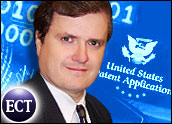
For years, the U.S. Patent and Trademark Office (PTO) has granted patents covering e-commerce business methods, and companies have exploited such patents to gain a competitive advantage in the marketplace.
In one famous example, Amazon.com sued Barnes & Noble just before the 1999 holiday season, alleging infringement of Amazon’s “1-click” shopping cart patent. The court granted Amazon’s request to force Barnes & Noble to modify its Web site, giving Amazon a leg up during the holiday season.
Although the validity of Amazon’s patent was later called into question, there are thousands of other e-commerce patents held by companies doing business on the Internet. Such patents have provided a valuable resource for companies to obtain venture capital and to protect research and development investments.
A Rare Hearing
However, an impending decision by the U.S. Court of Appeals for the Federal Circuit in Washington may soon change things. That court, which decides all patent appeals in the United States, held a rare full-court hearing on May 8 to decide whether to limit “process patents.” At issue in the case is a decision by the PTO to reject a patent application for a business process involving transactions designed to balance risks associated with commodity costs.
The invention did not involve a patentable process because no machine was involved, and the various process steps merely manipulated data instead of transforming something tangible, such as a plastic or metal, according to the PTO. The Federal Circuit invited the public to file briefs in the case, suggesting that the court might completely rewrite the law of business method patents. It specifically asked for comments on whether the court should overrule its controversial 1998 decision involving State Street Bank in which it upheld the validity of a patent on a computerized method of managing mutual funds.
At the full-court hearing, which hundreds of patent attorneys attended, Bernard Bilski’s attorney argued to the court that a process should be patentable as long as it produces a practical result, regardless whether it is tied to a machine or transforms something tangible. The various transactions in the patent were very specific and involved real-world activities, according to Bilski’s attorney. Several of the judges appeared to have difficulty agreeing with Bilski’s proposed “real-world” test for patentability and wanted a more clear-cut rule for it.
Some of the judges also appeared to question whether the “useful, concrete and tangible” patentability test applied in its earlier State Street case provided a workable standard to judge patentability. Bilski’s attorney endorsed the continuation of that standard, which has paved the way for tens of thousands of business method patents since the late 1990s.
A ‘Factor-Based’ Test
A law professor hired by Regulatory DataCorp, one of many companies that filed briefs in the case, argued that the PTO has taken too narrow a view of what is a patentable process, and urged the court not to draw any bright-line rules. Instead, professor John Duffy proposed that the court look at various factors to determine whether a process was patentable, including the extent to which the patent was connected to real-world activities. He also criticized the requirement that there must be something tangible and physical in order to constitute a patentable process. Some of the judges appeared to have difficulty accepting the lack of any concrete standard under this “factor-based” test.
The PTO argued that the U.S. Supreme Court years ago had made it clear that a patentable process must either be tied to a machine or must transform something physical. The judges explored whether throwing a baseball “transformed” the baseball in a patentable way, a position that the PTO rejected. Some of the judges expressed concern that adopting a rigid rule might eliminate patents on software-related inventions, but the PTO responded that most software implemented on computers would still be considered to be patentable.
Questioning Patent Validity
The financial services industry, represented by various companies, argued that the court should adopt a factor-based test for patentability that required tying the process to a physical machine in a non-conventional way. Several of the judges questioned whether “non-conventional” should be an added requirement for a process, given that every process must already be novel and non-obvious in order to qualify for a patent.
Although it is difficult to predict how the court might rule, it seems poised to issue clearer guidance regarding what types of processes can be patented. While some of the judges appeared to be concerned about eliminating patents in large sectors of the economy, such as computer software and the financial industry, other judges seemed to believe that the patenting of business methods has gotten out of hand and should be restrained.
Depending on how the court rules, the decision may have a wide-ranging effect on the patenting practices of e-commerce companies and may call into question the validity of tens of thousands of patents granted on business methods over the past decade. A decision is expected within a few months.
Bradley C. Wright is a patent attorney with Banner & Witcoff.



































Social Media
See all Social Media